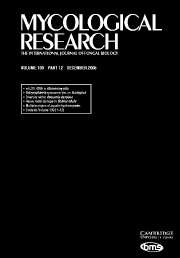Crossref Citations
This article has been cited by the following publications. This list is generated based on data provided by
Crossref.
Frazer, Lilyann Novak
1998.
One stop mycology.
Mycological Research,
Vol. 102,
Issue. 12,
p.
1571.
Hummel, Katrina M.
Inselman, Amy L.
Ramos, Erica R.
Gathman, Allen C.
and
Lilly, Walt W.
1998.
Extracellular protease production by submerged cultures ofSchizophyllum commune.
Mycologia,
Vol. 90,
Issue. 5,
p.
883.
Ohga, Shoji
Smith, Melvyn
Thurston, Christopher F.
and
Wood, David A.
1999.
Transcriptional regulation of laccase and cellulase genes in the mycelium of Agaricus bisporus during fruit body development on a solid substrate.
Mycological Research,
Vol. 103,
Issue. 12,
p.
1557.
Whiteford, J.R.
and
Thurston, C.F.
2000.
Vol. 42,
Issue. ,
p.
1.
Kingsnorth, Crawford S.
Eastwood, Daniel C.
and
Burton, Kerry S.
2001.
Cloning and Postharvest Expression of Serine Proteinase Transcripts in the Cultivated Mushroom Agaricus bisporus.
Fungal Genetics and Biology,
Vol. 32,
Issue. 3,
p.
135.
Rai, Raj D.
and
Ahlawat, O.P.
2002.
Agriculture and Food Production.
Vol. 2,
Issue. ,
p.
87.
Wagemaker, Matthijs J.M.
Eastwood, Daniel C.
Welagen, Jelle
van der Drift, Chris
Jetten, Mike S.M.
Burton, Kerry
Van Griensven, Leo J.L.D.
and
Op den Camp, Huub J.M.
2007.
The role of ornithine aminotransferase in fruiting body formation of the mushroom Agaricus bisporus.
Mycological Research,
Vol. 111,
Issue. 8,
p.
909.
Lilly, Walt W.
Stajich, Jason E.
Pukkila, Patricia J.
Wilke, Sarah K.
Inoguchi, Noriko
and
Gathman, Allen C.
2008.
An expanded family of fungalysin extracellular metallopeptidases of Coprinopsis cinerea.
Mycological Research,
Vol. 112,
Issue. 3,
p.
389.
Heneghan, Mary N.
Porta, Claudine
Zhang, Cunjin
Burton, Kerry S.
Challen, Michael P.
Bailey, Andy M.
and
Foster, Gary D.
2009.
Characterization of Serine Proteinase Expression in
Agaricus bisporus
and
Coprinopsis cinerea
by Using Green Fluorescent Protein and the
A. bisporus SPR1
Promoter
.
Applied and Environmental Microbiology,
Vol. 75,
Issue. 3,
p.
792.
Zhang, Xiaoqing
Liu, Qinghong
Zhang, Guoqing
Wang, Hexiang
and
Ng, Tzibun
2010.
Purification and molecular cloning of a serine protease from the mushroom Hypsizigus marmoreus.
Process Biochemistry,
Vol. 45,
Issue. 5,
p.
724.
Guan, Gui-Ping
Zhang, Guo-Qing
Wu, Ying-Ying
Wang, He-Xiang
and
Ng, Tzi-Bun
2011.
Purification and characterization of a novel serine protease from the mushroom Pholiota nameko.
Journal of Bioscience and Bioengineering,
Vol. 111,
Issue. 6,
p.
641.
Morin, Emmanuelle
Kohler, Annegret
Baker, Adam R.
Foulongne-Oriol, Marie
Lombard, Vincent
Nagye, Laszlo G.
Ohm, Robin A.
Patyshakuliyeva, Aleksandrina
Brun, Annick
Aerts, Andrea L.
Bailey, Andrew M.
Billette, Christophe
Coutinho, Pedro M.
Deakin, Greg
Doddapaneni, Harshavardhan
Floudas, Dimitrios
Grimwood, Jane
Hildén, Kristiina
Kües, Ursula
LaButti, Kurt M.
Lapidus, Alla
Lindquist, Erika A.
Lucas, Susan M.
Murat, Claude
Riley, Robert W.
Salamov, Asaf A.
Schmutz, Jeremy
Subramanian, Venkataramanan
Wösten, Han A. B.
Xu, Jianping
Eastwood, Daniel C.
Foster, Gary D.
Sonnenberg, Anton S. M.
Cullen, Dan
de Vries, Ronald P.
Lundell, Taina
Hibbett, David S.
Henrissat, Bernard
Burton, Kerry S.
Kerrigan, Richard W.
Challen, Michael P.
Grigoriev, Igor V.
and
Martin, Francis
2012.
Genome sequence of the button mushroomAgaricus bisporusreveals mechanisms governing adaptation to a humic-rich ecological niche.
Proceedings of the National Academy of Sciences,
Vol. 109,
Issue. 43,
p.
17501.
Wang, Shou-Xian
Liu, Yu
Zhang, Guo-Qing
Zhao, Shuang
Xu, Feng
Geng, Xiao-Li
and
Wang, He-Xiang
2012.
Cordysobin, a novel alkaline serine protease with HIV-1 reverse transcriptase inhibitory activity from the medicinal mushroom Cordyceps sobolifera.
Journal of Bioscience and Bioengineering,
Vol. 113,
Issue. 1,
p.
42.
Al-Musallam, A.A.
Al-Gharabally, D.H.
and
Vadakkancheril, N.
2013.
Biodegradation of keratin in mineral-based feather medium by thermophilic strains of a new Coprinopsis sp..
International Biodeterioration & Biodegradation,
Vol. 79,
Issue. ,
p.
42.
Heneghan, Mary N.
Burns, Claire
Costa, Ana M. S. B.
Burton, Kerry S.
Challen, Michael P.
Bailey, Andy M.
and
Foster, Gary D.
2016.
Functional analysis of Agaricus bisporus serine proteinase 1 reveals roles in utilization of humic rich substrates and adaptation to the leaf‐litter ecological niche.
Environmental Microbiology,
Vol. 18,
Issue. 12,
p.
4687.
Guhr, Alexander
Horn, Marcus A.
and
Weig, Alfons R.
2017.
Vitamin B2(riboflavin) increases drought tolerance ofAgaricus bisporus.
Mycologia,
Vol. 109,
Issue. 6,
p.
860.
Kernaghan, Gavin
and
Mayerhofer, Michael
2017.
Zymography.
Vol. 1626,
Issue. ,
p.
33.
XIANG, QUANJU
LUO, LIHUA
LIANG, YUHUAN
CHEN, QIANG
ZHANG, XIAOPING
and
GU, YUNFU
2017.
The Diversity, Growth Promoting Abilities and Anti-microbial Activities of Bacteria Isolated from the Fruiting Body of Agaricus bisporus
.
Polish Journal of Microbiology,
Vol. 66,
Issue. 2,
p.
201.
Sakamoto, Yuichi
2018.
Influences of environmental factors on fruiting body induction, development and maturation in mushroom-forming fungi.
Fungal Biology Reviews,
Vol. 32,
Issue. 4,
p.
236.
Zhang, Chaohui
Zhang, Guang
Wen, Yamei
Li, Tao
Gao, Yuqian
Meng, Fanmei
Qiu, Liyou
and
Ai, Yuncan
2019.
Pseudomonas sp. UW4 acdS gene promotes primordium initiation and fruiting body development of Agaricus bisporus.
World Journal of Microbiology and Biotechnology,
Vol. 35,
Issue. 11,


